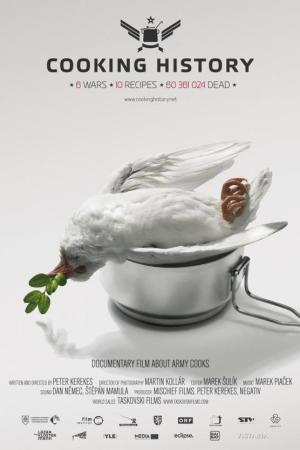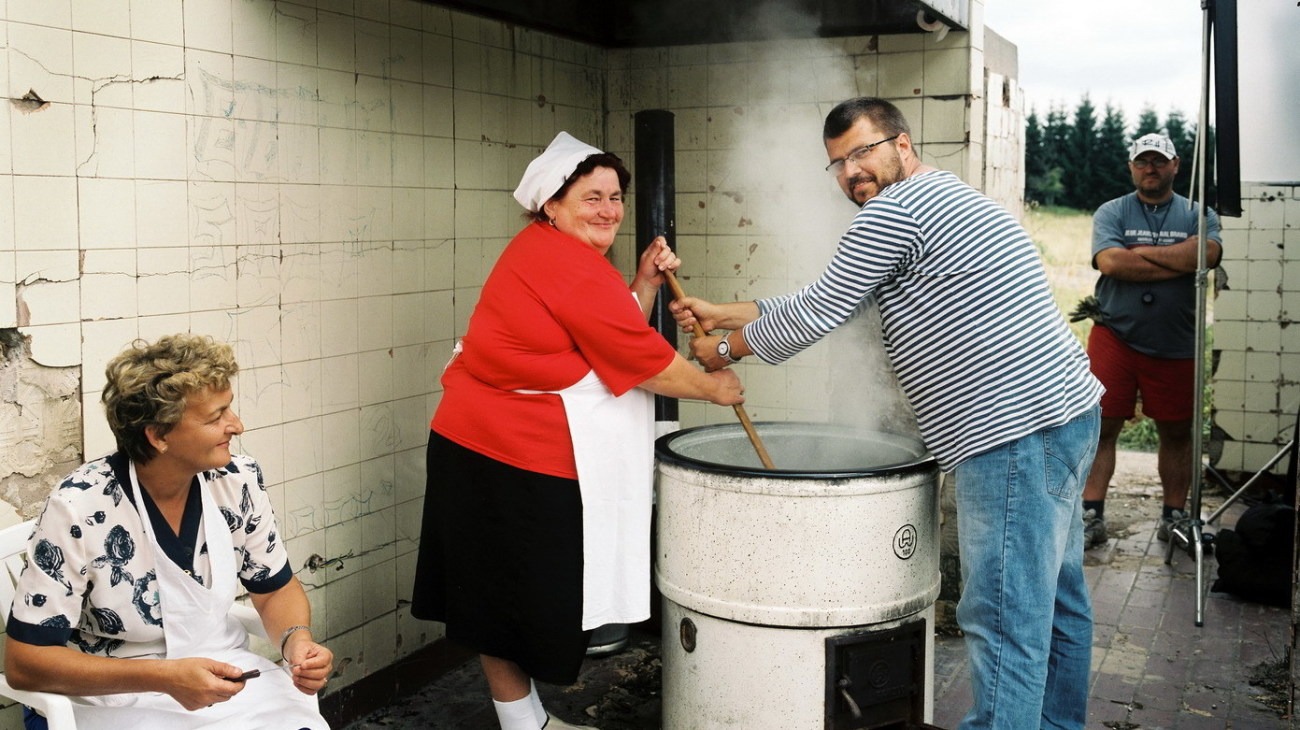
The 45th Chicago International Film Festival
I am having a rough festival for documentaries. First it was Cropsey, a film that I could only give such qualified praise that I might as well have come right out and call it a trainwreck.
The offender this time is Cooking History, a film with what I thought sounded like an irresistibly sexy hook: several important 20th Century European wars are discussed in terms of the men and women who prepared food for the armies in those conflicts. As one who loves cooking, and is reasonably entertained by a good war documentary, this was probably one of my most-anticipated of the Fest. I hate to say it, because the end result is pretty damn flimsy, tossing on as much information as can be crammed into 88 minutes without first pausing to make sure that all of the information built up to anything interesting or suggestive. I'm sorry, I should take a cheap shot. Cooking History is, indeed, suggestive; it suggests that without army cooks, soldiers would starve to death. That, dear reader, is the kind of rigorous, probing journalism that you just do not see in American documentary films these days!
I'm sorry, that was entirely too snippy. Fair is fair, Cooking History actually does come up with quite a few interesting little tidbits in its scant running time. The structure of the film is chronological, beginning with World War II, which appropriately enough gets the most time of any of the conflicts named: director Péter Kérekes interviews a Russian woman who cooked for soldiers out of her hometown, a German cook who traveled with his camp (and a small cache of former soldiers who wax nostalgic about the bread they got in the service), and in a particularly interesting video that appears to have been filmed entirely separately from the rest of the production, he speaks with a Jewish resistance fighter who managed to get a job with one of his comrades baking bread for the guards at a concentration camp; despite the well-documented fact that arsenic is not a kosher ingredient, this was the special touch that the two men added to their loaves to make certain that the Nazis got all the nutrition they deserved.
The WWII segment is by far the most carefully assembled part of the whole movie. The cross-cutting from one interview subject to another is well-done and insightful, and the pairing of the Jewish man's story with modern day footage of the German making bread in his huge, ancient oven is undoubtedly the film's highlight. Unfortunately, when the time comes to move forward, Cooking History starts to lose its focus.
We see, in order, a Hungarian reminiscing about having to prepare food for the occupying Soviet army in 1956, a pair of Frenchmen with deeply conflicting memories of the Algerian War of Independence, a Czech recalling the Soviet occupation of 1968 (thank God for the Soviets; their occupations add a solid 20 minutes to the film), the personal chef to Josip Broz Tito who recalls with some dismay the culinary fragmentation that accompanied the ethnic disintegration of Yugoslavia, a Croat and a Serb discussing their rather different perspectives on the fall-out of said disintegration, and at last, a coda with the chef on a German submarine, who provides a rather nuanced metaphor that ought to - but does not - tie all the stories together into a neat package.
So at the end of Cooking History, what do I know? I know that military cooks all throughout Europe believe (probably with justification) that they are the backbone of the armed forces; I have also learned that military cooks are surprising apolitical, except for the Croats. But any sort of pan-historical lesson is right out (the only attempt Kérekes makes to unite the strands into one is to display, onscreen, the recipe that each individual cook is discussing, in proportions that suggest the story he or she is illustrating - "Blintzes for 100,000 lost fliers", things like that), and while you could squint a bit and say that each speaker is talking about a different facet of what it means to be a military cook, that's not a terribly satisfying conclusion that the film only just barely endorses, anyway. In the end, Cooking History is a mulligan stew (OW, bad pun, sorry): plenty of individually fascinating anecdotes get tossed all together and the resulting mixture doesn't do anything to draw them out. It's just a sludge of ideas.
The really irritating thing is that a much more sensible way to package these stories - one that gives each war its own focus, lets the themes come out more gradually, and tells us a lot more about the people in the process - is so obvious that I half wonder if Kérekes tried it and failed. Simply put, Cooking History would be a natural fit for a six-episode TV series; one per war, and maybe make WWII double-length, because hell, it's everybody's favorite, right? I'll tell you what, I'd be excited for that show. I'd DVR that show. But as a stripped-down feature, all I can think is how much more interesting all this would be if it had the space to mean anything.
6/10
The offender this time is Cooking History, a film with what I thought sounded like an irresistibly sexy hook: several important 20th Century European wars are discussed in terms of the men and women who prepared food for the armies in those conflicts. As one who loves cooking, and is reasonably entertained by a good war documentary, this was probably one of my most-anticipated of the Fest. I hate to say it, because the end result is pretty damn flimsy, tossing on as much information as can be crammed into 88 minutes without first pausing to make sure that all of the information built up to anything interesting or suggestive. I'm sorry, I should take a cheap shot. Cooking History is, indeed, suggestive; it suggests that without army cooks, soldiers would starve to death. That, dear reader, is the kind of rigorous, probing journalism that you just do not see in American documentary films these days!
I'm sorry, that was entirely too snippy. Fair is fair, Cooking History actually does come up with quite a few interesting little tidbits in its scant running time. The structure of the film is chronological, beginning with World War II, which appropriately enough gets the most time of any of the conflicts named: director Péter Kérekes interviews a Russian woman who cooked for soldiers out of her hometown, a German cook who traveled with his camp (and a small cache of former soldiers who wax nostalgic about the bread they got in the service), and in a particularly interesting video that appears to have been filmed entirely separately from the rest of the production, he speaks with a Jewish resistance fighter who managed to get a job with one of his comrades baking bread for the guards at a concentration camp; despite the well-documented fact that arsenic is not a kosher ingredient, this was the special touch that the two men added to their loaves to make certain that the Nazis got all the nutrition they deserved.
The WWII segment is by far the most carefully assembled part of the whole movie. The cross-cutting from one interview subject to another is well-done and insightful, and the pairing of the Jewish man's story with modern day footage of the German making bread in his huge, ancient oven is undoubtedly the film's highlight. Unfortunately, when the time comes to move forward, Cooking History starts to lose its focus.
We see, in order, a Hungarian reminiscing about having to prepare food for the occupying Soviet army in 1956, a pair of Frenchmen with deeply conflicting memories of the Algerian War of Independence, a Czech recalling the Soviet occupation of 1968 (thank God for the Soviets; their occupations add a solid 20 minutes to the film), the personal chef to Josip Broz Tito who recalls with some dismay the culinary fragmentation that accompanied the ethnic disintegration of Yugoslavia, a Croat and a Serb discussing their rather different perspectives on the fall-out of said disintegration, and at last, a coda with the chef on a German submarine, who provides a rather nuanced metaphor that ought to - but does not - tie all the stories together into a neat package.
So at the end of Cooking History, what do I know? I know that military cooks all throughout Europe believe (probably with justification) that they are the backbone of the armed forces; I have also learned that military cooks are surprising apolitical, except for the Croats. But any sort of pan-historical lesson is right out (the only attempt Kérekes makes to unite the strands into one is to display, onscreen, the recipe that each individual cook is discussing, in proportions that suggest the story he or she is illustrating - "Blintzes for 100,000 lost fliers", things like that), and while you could squint a bit and say that each speaker is talking about a different facet of what it means to be a military cook, that's not a terribly satisfying conclusion that the film only just barely endorses, anyway. In the end, Cooking History is a mulligan stew (OW, bad pun, sorry): plenty of individually fascinating anecdotes get tossed all together and the resulting mixture doesn't do anything to draw them out. It's just a sludge of ideas.
The really irritating thing is that a much more sensible way to package these stories - one that gives each war its own focus, lets the themes come out more gradually, and tells us a lot more about the people in the process - is so obvious that I half wonder if Kérekes tried it and failed. Simply put, Cooking History would be a natural fit for a six-episode TV series; one per war, and maybe make WWII double-length, because hell, it's everybody's favorite, right? I'll tell you what, I'd be excited for that show. I'd DVR that show. But as a stripped-down feature, all I can think is how much more interesting all this would be if it had the space to mean anything.
6/10
Categories: ciff, documentaries, war pictures






